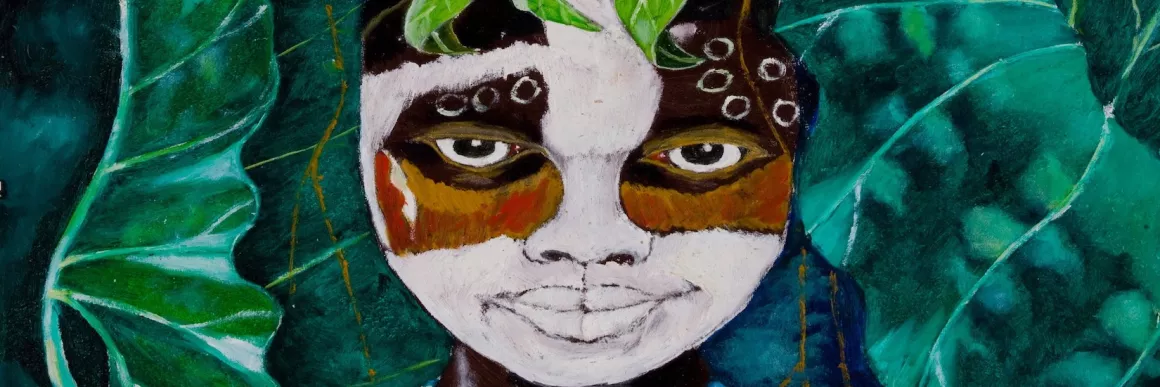©Colonel Lumsden, "Quashie." Circa 2009. Lumsden Family Collection.
Romanticism and Anti-Slavery Literatures: Pedagogies and Contexts reflects on the question of what it means to teach abolitionist and anti-slavery literature of the long nineteenth century in the wake of the Black Lives Matter movement. Urgent questions remain regarding what it means to teach Romantic anti-slavery and abolitionist texts in the current moment, despite the field’s reassessment of its complicity in and resistance to Atlantic slavery and its global repercussions. As Patricia Matthew, Ivan Ortiz, Elizabeth Fay, Sean Gordon, Frances Botkin, and Nicholas Blaisdell describe their experiences in the classroom, they articulate linkages that connect their teaching praxis with histories of resistance and liberation, even as they also seek to problematize the idea that abolitionist texts can be considered straightforwardly liberatory. The contributors argue that it is not enough to teach abolitionist texts from the period without also engaging other contexts, including modern perspectives on the legacies of slavery. Drawing of the work of Edward Said, Simon Gikandi, and Fernando Ortiz, the introduction to the volume offers a meditation on 'contrapuntal reading' as theoretical framework that further elucidates what the contributors collectively achieve by orchestrating these dialogues between past and present. The responses by Alan Richardson and Debbie Lee consider the intervention that the collection makes within the larger pedagogical conversation of the last thirty years, in order to point to the new directions of inquiry the contributors suggest, both for teaching and for scholarship.
Abstract
The Introduction offers contrapuntal reading as a theoretical framework that elucidates what the contributors collectively achieve. After discussing how a 2018 roundtable on teaching abolitionist and anti-slavery literatures amidst the Black Lives Matter movement sparked the collection, the editors offer an overview of pedagogical work in this field, before looking forward to a range of possible new directions of enquiry.
Abstract
This essay reflects on the process of revising Romanticism courses in response to student curiosity about how race, primarily Blackness, operates in the period. It includes a discussion of how teaching texts by William Blake, Samuel Taylor Coleridge, Amelia Opie, Robert Southey, and William Wordsworth reveals to students how the period connects race to issues of representation, authorship, gender, and social contracts.
Abstract
This essay investigates the often-overlooked musical history of English antislavery ballads in order to complicate their construction of enslaved black political voices. Following Lynn Festa’s invitation to listen beyond voices and silences in the archive of transatlantic slavery, Ortiz argues that ballad tune might be read as a meaningful white noise in the dark imperial soundscape of the Atlantic world.
Abstract
How, as teachers of the literature and history of slavery, are we to address the fact that our classrooms and campuses are still yet structured by the social relations of slavery? Using an Afropessimist framework that alerts us to the anti-Blackness of the American academy, in particular, and colonial modernity at large, this essay discusses teaching the literature of slavery and abolition as an exploration of "the pathology of Whiteness" and "the Slave grammar of suffering."
Triangulating (Textual) History: What Early Black British Narratives Teach Us about the Future to Come
Elizabeth FayAbstract
For an Atlanticist pedagogy, I enlist the historical nautical strategy of triangulation between Africa, the Caribbean, and Britain as the triangulation of three narratives; the triangulation of literary interpretation with historical and current interpretive concepts and methods; the triangulation of Atlantic coasts and land entities; and the triangulation of the strategic, nonliterary terms “fluidity,” “circulation,” and “movement.”
Abstract
My pedagogy has been inspired by tunyuhan (turn your hand), Jamaican practices of improvisation and sustainability. I animate Romantic period texts with postcolonial Afro-Caribbean creative expressions, which, in revising the past, imagine and nourish future worlds. These materials, often non-literary, help to refashion Romanticism beyond the archive.
Abstract
This essay analyzes the powerful nexus between antislavery pedagogy, recognizing one’s own historical agency, and engaging in civic action in the context of the Black Lives Matter movement. I explore my own role as a pre-service teacher, social justice activist, and emerging scholar in the field of education in the context of the antislavery archive that shaped my undergraduate research and study.
Abstract
In my essay-response “Emergent,” I engage with the essays in Romantic Circles' volume Romanticism and Anti-Slavery Literatures: Pedagogies and Contexts, responding to contributions from Patricia Matthews, Elizabeth Fay, Sean Gordon, Fran Botkin, Ivan Ortiz, Nicolas Blaisdell, and others. Drawing on adrienne maree brown's Emergent Strategy: Shaping Change, Changing Worlds (2017), I explore how Romantic studies can facilitate decentralized, intentional change.
Abstract
From the vantage point of our present twenty-first century moment, it would seem impossible to miss the centrality of issues of slavery and freedom, of racial oppression and Black resistance, to British economic, political, and cultural life during the five decades from the 1780s through the 1830s. Yet until (comparatively) quite recently, academic and critical discourses on British Romantic literature left these issues all but entirely out of account.
About
Pedagogy Series Editors: Andrew Burkett and Kirstyn Leuner
Romanticism and Antislavery Literatures: Pedagogies and Contexts © 2025 by Joselyn M. Almeida, Amelia Worsley is licensed under CC BY-NC-ND 4.0

